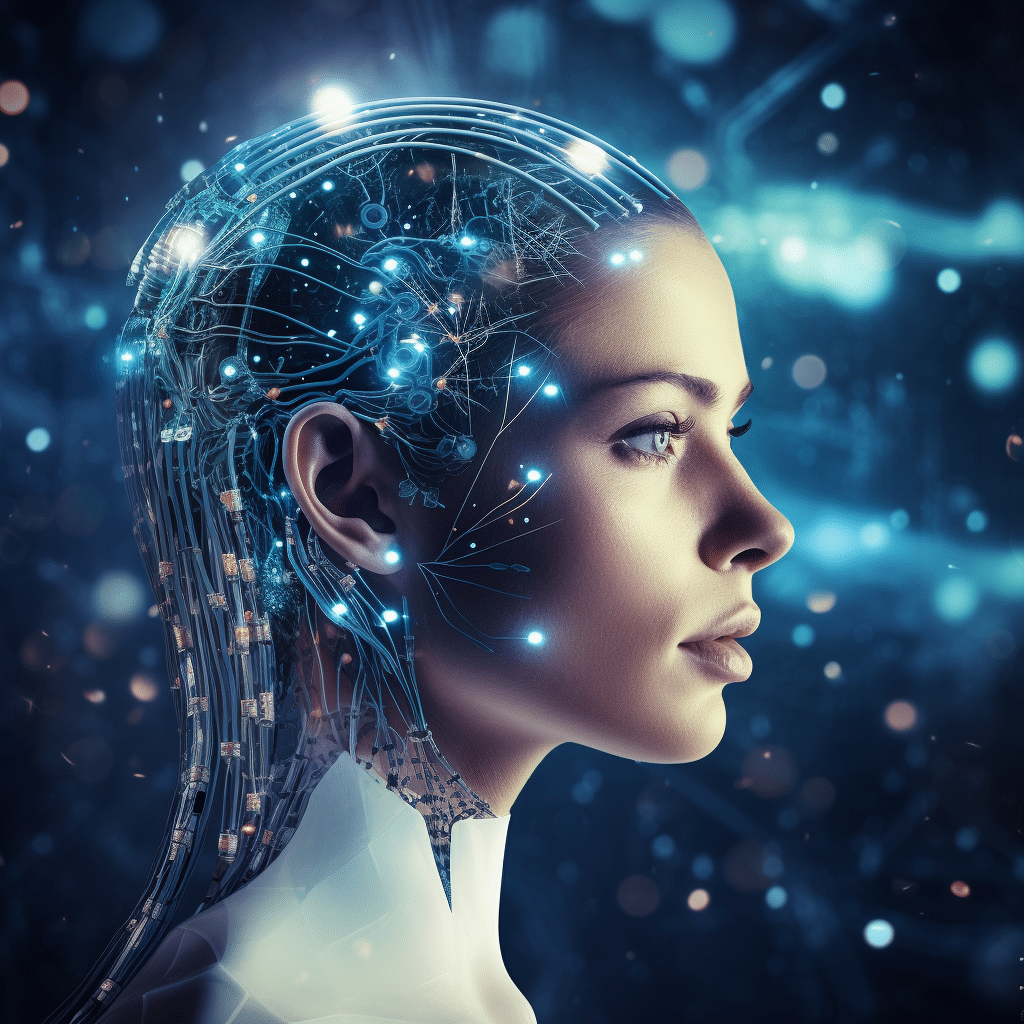
AI and Mental Health: Opportunities and Concerns
Opportunities for AI in Mental Health Care

AI has the potential to improve mental health care in numerous ways.A key opportunity is early detection and diagnosis of mental health issues. AI systems analyze large volumes of data to uncover patterns and signs of mental health disorders that are often overlooked. This allows for prompt intervention and therapy, potentially preventing mental health decline.
Additionally, AI-powered chatbots and virtual assistants can offer ongoing assistance to those in need. AI systems can converse with users, provide individualized coping tactics, and track their emotional well-being. We offer 24/7 access and tailored assistance to bridge the gap between therapy sessions and improve daily mental health management.
AI plays a crucial role in mental health by monitoring and predicting suicide risks. AI algorithms can identify at-risk individuals and notify healthcare experts or emergency services by evaluating social media posts, internet behavior, and other pertinent data. This proactive strategy can save lives by offering timely support and intervention to persons in trouble.
Concerns and Considerations
While AI presents exciting opportunities in the field of mental health, it is essential to address potential concerns. One significant concern is the ethical use of data. AI algorithms rely heavily on vast amounts of personal information to analyze and predict mental health outcomes. Ensuring privacy, security, and informed consent is crucial to protect the individuals involved.
Moreover, there is also a concern regarding the potential dehumanization of therapy. Although AI can offer valuable support, it should not replace human interaction and empathy. It is vital to strike a balance between technological advancements and maintaining the critical human connection in mental health care.
“AI has the potential to revolutionize mental health treatment, offering new tools and strategies. However, it is important to proceed cautiously, addressing ethical concerns and preserving the human touch.” – Dr. Rebecca Thompson, Mental Health Specialist.
AI presents opportunities for significant advancements in the field of mental health. From early detection and personalized support to risk prediction and crisis intervention, AI technologies have the potential to make a meaningful impact on individuals’ well-being. However, it is essential to proceed thoughtfully, ensuring ethical practices and acknowledging the importance of the human element in mental health care.
What ethical concerns surround the use of AI in mental health interventions?
The use of AI in mental health interventions raises several ethical concerns, including:
1. Privacy and data protection:
AI in mental health interventions may require collecting and analyzing sensitive personal data. There is a risk of data breaches or unauthorized access to this information, potentially leading to the misuse or exploitation of individuals’ mental health data.
2. Informed consent and transparency:
Users should have clear information about the AI intervention, including its capabilities, limitations, and potential risks. Ensuring informed consent may be challenging, particularly if users do not fully understand the AI technology and its potential implications.
3. Bias and discrimination:
AI models are trained on large datasets, which may reflect biases inherent within them. If these biases are not addressed, AI interventions could perpetuate or amplify existing biases and discrimination within mental healthcare, potentially leading to unequal treatment or outcomes for certain populations.
4. Lack of human connection and empathy:
AI may lack the emotional intelligence, empathy, and human connection that humans typically provide in mental health interventions. This raises concerns about the quality of care and the potential consequences of relying solely on AI without human involvement.
5. Accountability and transparency of algorithms:
The decision-making processes of AI algorithms can often be complex and opaque. Concerns arise regarding the transparency and accountability of these algorithms, as individuals may be reluctant to trust or rely on AI systems when they cannot understand how they arrive at their recommendations or decisions.
6. Limited accessibility:
AI interventions require digital infrastructure and access to technology. This could lead to exclusion and disparities in access to mental health services, particularly for marginalized populations or those with limited access to technology or digital resources.
7. Ethical considerations in research and development:
Ethical practices should be followed during the development, testing, and deployment of AI interventions in mental health. This includes obtaining proper ethical approvals, ensuring participant safety, and addressing any potential risks or harm that may arise during the research process.
Addressing these ethical concerns requires careful consideration and regulation to ensure the responsible and ethical use of AI in mental health interventions.
How can AI help address the increasing demand for mental health support and services
AI can help address the increasing demand for mental health support and services in several ways:
1. Automated Mental Health Assessments:
AI-powered chatbots and virtual assistants can conduct initial mental health assessments by asking relevant questions and collecting information about symptoms and well-being. This can assist in identifying individuals who may require immediate support or intervention.
2. Personalized Mental Health Intervention:
AI can provide personalized treatment plans based on an individual’s specific needs and preferences. By analyzing vast amounts of data, including symptoms, medical history, and treatment outcomes, AI algorithms can suggest appropriate interventions and therapies, improving the effectiveness of mental health treatments.
3. Remote Therapy and Counseling:
AI can facilitate remote therapy and counseling sessions, making mental health services more accessible to individuals, particularly those in remote areas or with limited mobility. AI-powered chatbots and virtual therapists can offer support, guidance, and resources to individuals in real-time.
4. Early Detection of Mental Health Issues:
By analyzing data from social media platforms, search engines, wearable devices, and electronic health records, AI algorithms can detect patterns and indicators of mental health issues. This early detection allows for timely intervention and prevention of more severe conditions.
5. Cognitive Behavioral Therapy (CBT) Assistance:
AI can support individuals undergoing cognitive-behavioral therapy by providing real-time feedback, reminders, and personalized coping strategies. AI-enhanced CBT tools can help individuals build resilience, develop healthy habits, and manage their mental health effectively.
6. Data Analysis and Research:
AI can analyze large sets of mental health data to identify trends, risk factors, and treatment efficacy. This can lead to important insights for mental health professionals, improving diagnosis accuracy, treatment selection, and overall understanding of various mental health conditions.
It is worth noting that while AI can undoubtedly enhance mental health support and services, it should not replace human interaction and care. AI should be seen as a complementary tool, working alongside mental health professionals to augment their expertise and provide better access to services.
How can artificial intelligence be leveraged to improve mental health diagnosis and treatment?

Artificial intelligence can be leveraged to improve mental health diagnosis and treatment in several ways:
1. Early detection and diagnosis:
AI can analyze vast amounts of patient data, including electronic health records, social media activity, and sensor data from wearables, to identify patterns and indicators of mental health conditions. This can help in early detection and timely intervention.
2. Personalized treatment plans:
AI algorithms can utilize patient information to develop personalized treatment plans based on the specific needs and characteristics of individuals. By considering various factors like genetics, medical history, lifestyle, and response to previous treatments, AI can tailor treatment plans for better outcomes.
3. Virtual mental health assistants:
AI-powered chatbots and virtual therapists can provide 24/7 support to individuals with mental health issues. These virtual assistants can engage in conversations, offer coping strategies, and provide resources or referrals, improving accessibility and reducing the stigma associated with seeking help.
4. Predictive analytics and relapse prevention:
AI algorithms can analyze data from various sources and predict the likelihood of relapses or worsening symptoms. This enables healthcare providers to intervene proactively and prevent potential crisis situations.
5. Precision medicine:
AI can help identify which medications or therapies are likely to be most effective for an individual based on their unique biological and psychological makeup. This can minimize trial and error in treatment selection and improve patient outcomes.
6. Monitoring and feedback:
AI systems can continuously monitor individuals’ mental health status and provide real-time feedback to them and their healthcare providers. This allows for timely interventions and adjustment of treatment plans based on observed changes or trends.
7. Research and data analysis:
AI can analyze large datasets from multiple sources to identify trends, risk factors, and treatment efficacy across diverse populations. This can contribute to evidence-based practices and support advancements in mental health research.
However, it’s crucial to note that while AI has the potential to enhance mental health diagnosis and treatment, it should always complement and not replace human interaction and expertise. Ethical considerations around data privacy, bias, and accountability also need to be addressed for responsible and effective use of AI in mental healthcare.








